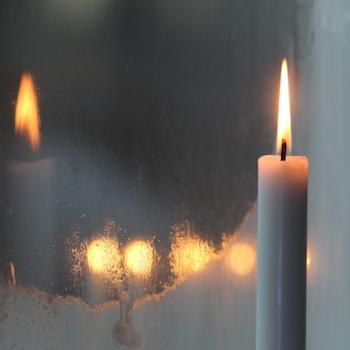I often find religious organizations’ statements of belief alienating. How does a living, breathing, growing faith relate to a rigid, overly-specific belief statement? Are these the best terms to frame it in? What if faith is more of a practice—an ever-evolving faithful way of life—than a delineation of doctrine?
Belief Statements and Belonging
I’m especially irked when organizations require individuals to sign off on their belief statements. If I can sign a statement and become a member of a group, but then I’ll get kicked out (or at least get a stern talking-to) if I change my mind about one of the beliefs on that statement—is that really belonging?

In The Gifts of Imperfection, Brené Brown writes this: “In order to feel a true sense of belonging, I need to bring the real me to the table and that I can only do that if I’m practicing self-love. For years I thought it was the other way around: I’ll do whatever it takes to fit in, I’ll feel accepted, and that will make me like myself better.”
Amen to that. Real belonging involves bringing our real selves to the table. It isn’t doing whatever it takes to fit in. That’s not real love, or real belonging.
Belief Change and Its Costs
I know very well the power of wanting to fit in, and how it can twist us.
When I was working in college ministry at a conservative evangelical church in my mid-twenties, I found myself slowly becoming LGBTQ+ affirming. The more I thought about it, studied, listened, and prayed, the more affirming I became. But I knew I couldn’t voice any of this to my supervisors or colleagues.
It would not be accepted. I could lose my job. And, for the most part, I liked my job.
This was not a healthy environment. It was not an environment that promoted intellectual or emotional honesty. Instead, it promoted hiding.
I was reading recently from the Gospel of John, a passage where many leaders believe in Jesus, but they will not openly admit it. They are too afraid of a particular group of religious leaders and how they would react (see John 12:42-43). In particular, they are afraid of being “put out of the synagogue”—that is, excluded from their religious community. Excommunicated.
This, too, was not an environment that encouraged authenticity. Believing in Jesus was just a little too out there. It did not conform to their expectations.
I’m no longer interested in being part of communities that demand assent to a laundry list of belief statements. I want to be part of communities that are open to beliefs changing over time—communities that foster openness to change.
Belief Statements, Practice, and the Early Church
I think it’s also worth asking this: Why is it necessary for everyone to agree on everything? Why do faith leaders feel the need to make everyone conform to one set of beliefs? Isn’t it more interesting when we don’t?
Jesus’ disciples certainly did not agree about everything, and neither did the early church leaders.
At their best, they talked things through, and they learned to live together as a mutually supportive community in the midst of their differences. At their best, their differences made them stronger (as in the body metaphor of 1 Corinthians 12:12-31). At their best, they hashed out the things that felt really important to a life of faith and let other things go. They let people live according to their own consciences (a la Romans 14:1-12).
At their best, early church leaders learned to give up their own need for control. They learned to make room for God’s Spirit to speak in different ways to different people. They embraced the surprising movements of this unpredictable, wild Spirit.
At their worst, of course, early church leaders convened councils with exclusive—and, of course, exclusively male—guest lists and fought verbally to assert dominance over one another until one side “won.” Then they proclaimed everyone else heretics and cast them out.
This is hardly an appealing vision of church. We do not have to recreate it.
Some Beliefs Oppress
It seems worth adding some nuance here. I’m not exactly trying to say that our beliefs don’t matter, or that all beliefs are equally good.
I do think there are beliefs that damage ourselves, other people, our communities, and this world. There are beliefs that damage the earth which is our sustenance, on whom we depend. There are beliefs that deeply damage people of color, people living in poverty, women, LGBTQ+ people, and other already-marginalized groups.
There are beliefs, for example, that spark vicious attacks on queer communities, like the recent shooting at an LGBTQ night club in Colorado Springs. There are beliefs that are hateful, that dehumanize others, that provoke violence.
We can’t exactly just agree to disagree about everything. Some beliefs are certainly worth arguing about.
I think about author Robert Jones Jr.’s words from a 2015 Son of Baldwin tweet: “We can disagree and still love each other unless your disagreement is rooted in my oppression and denial of my humanity and right to exist.”
There are some beliefs that are oppressive, and, because of this, close the door to a real relationship between the person who holds the belief and the person who is oppressed by the belief. As bell hooks writes wisely in The Will to Change, “Love cannot coexist with domination.”
If we are really trying to be loving, there are things we just can’t do. And there are things we just can’t believe. Or, more precisely, there are things we can believe—because we humans are always full of contradictions—but that directly contradict our aim of love.
A Practice and a Way of Life
I am not saying that our beliefs are unimportant. I am saying, though, that the faith communities I want to be a part of these days aren’t terribly interested in requiring everyone to agree about all the tenets of a particular sect of Christianity.
Too many churches still expect exactly that. Too many religious organizations still require people to sign on to things they may or may not actually believe now—let alone still believe in ten years—if they want to be accepted by the group.
Christian faith, for me, is less about a particular list of doctrines and more about a set of practices, a way of life, and a community.
My hope is that this perspective helps me be more open to others who see things differently. I hope it helps them be more open to me, too. I hope it helps us all cultivate real belonging, where we can be our authentic selves and not be rejected for it.
Sometimes when people move from more conservative views to more progressive ones—as I have done—we recreate the same sort of rigid dogmatism, just on the other side. I’m not interested in that. I am interested in love that changes us. A community that sustains us. Prayer and worship and music and communion and love that nourishes our souls.
I want to be part of communities that come together across our differences to try to live as Jesus lived, pay attention to God’s Spirit, and learn to embody God’s love and justice together.
Hold the belief statements. Let’s find the practices that sustain us, together.












